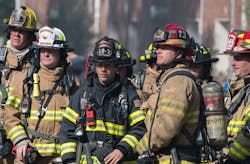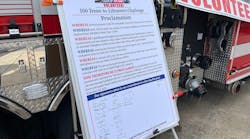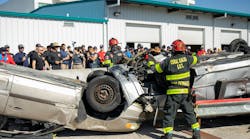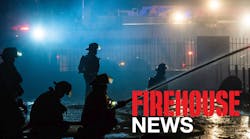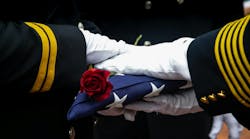I have been fortunate in my fire service career to serve in three departments as a civilian and military firefighter. I have done this in three states and on two continents. Because of my background, I can say one thing for sure: The fire service is always changing—and the average firefighter hates change. Whether it’s related to a tool or a tactic, firefighters will instinctively try to find a flaw or a reason not to use or apply it.
Of all the things I have seen firefighters balk at and avoid, there is one where there seems to be resistance from individual firefighters and the fire service as a whole—trying to understand the generational gap and how to make it work for the department. Because the fire service typically attracts younger people, and older firefighters tend to stay past their projected retirement date, the result is a huge melting pot of different upbringings, ideas and views on how to accomplish goals. Understanding and dealing with the different generations in order to effectively facilitate our mission is now as crucial as any other skillset taught in the fire service.
What makes a group of people born around the same time share so many traits? In a nutshell, it is the culture of the time. The experiences, beliefs and attitudes that we are exposed to as a group shape our thoughts and feelings. For example, I have a very laid-back approach to raising my children, while across my street are neighbors who are much stricter. While the children are close to the same age, their actions and beliefs are often quite different as a result of the different cultural exposure.
An application of this is Halloween in my neighborhood. My family and I look forward to it and enjoy planning our costumes, decorating the front yard and, of course, scaring people. My neighbors do not celebrate Halloween. While these two groups of children can play together and expound on all things Justin Bieber, they find themselves on opposite sides of the Halloween debate based on the norms each family has set forth based on their beliefs. Similarly, my oldest son can recite what happened at Pearl Harbor but lacks the empathy to truly describe it. His memory of the 9/11 attacks is quite vivid with facts and how it affected the people around him, namely me. If we take these small examples and expand them over an entire population, we start to see how generations are formed.
Baby Boomers
Currently, as I look around my department, I see the most experienced firefighters and the next group to retire—the Baby Boomers. This generation was born between 1946 and 1964. They are very goal-oriented and like to work together as a team. The Baby Boomers are known for avoiding conflict and, in my experience, like to work out issues directly rather than use the chain of command. In trying to frame this within the fire service, we can think of the Baby Boomers as the captains and above, the “old school” firefighters. These are the “if you have a problem with something I do, then tell me” guys. This group also expects to tell subordinates to do something and have them do it without question—and do it well. They take great pride and have confidence in what they do and they expect their men to do the same.
Gen Xers
The next group of firefighters I see make up the majority of the fire department and the ones finally getting promoted and/or moving into positions to help the department. These are my generation, the Gen-Xers. We were born between the 1960s and 1980s. We are a smaller group than the Baby Boomers and Millennials, but we accomplished a lot! Don’t believe me? Look it up on the palm-sized computer in your pocket that plays entire movies in high-definition. We were the latch-key kids. Our moms went to work and the TV was the best babysitter we could ask for. We learned to be independent and productive. Technology exploded during this time, and we adapted very easily with great joy. We were the “early adopters” of all things tech. We were also the perfect generation to follow Baby Boomers in the fire service. We appreciate authority and, unlike our parents, we work to live, not to live to work. Baby Boomers and Gen-Xers work very well together in the fire department. They show us the way and we gladly follow their path.
Millennials
The next generation, the Millennials, were born in the 1980s and 1990s and, unlike the previous generations, they have always had technology and its uncanny ability to make everyday life easy. These are the new recruits in the fire service. This gaggle of youth loves to know the “whys” of everything, and if they don’t like the whys, then they will offer an alternative. They are very tech-savvy and love to innovate. This is a huge generation that likes to see and think globally, and is less likely to start a fight. They are not afraid to tell anybody or everybody what they think and feel. Unfortunately, they would also prefer not to hear what anybody else thinks or feels. We have to remember this is the group that grew up getting participation trophies and attendance awards just for showing up. Who wouldn’t love that? This generation, for right or wrong, loves a pat on the back with an attaboy kicker.
Comparing generations and why it matters
So what’s the big deal about generations? Remember earlier when I described the Baby Boomer bosses? Their generation didn’t need awards and trophies, earned or otherwise. They were told once how to do things and were expected to do them right the first time. Now these guys have subordinates who question everything. “Hey kid, clean the bathroom before 9 a.m. and make your bed after that.” The response: “Why can’t I make my bed first then clean the bathrooms after that? That will allow for the other shift to use the bathroom and leave after their shift and I won’t have to clean it twice!” We can see where this would be aggravating as an old salty firefighter, even if the suggestion is a good one. The kneejerk reaction is for the captain to make the new guy clean the bathrooms every hour for the rest of the shift to “show him who’s the boss.” The problem is that won’t work because only one person will be happy—and it won’t be the person cleaning the bathroom every hour. At this point, it becomes less about explaining where the new recruit fits in the organization and more about pride for the boss. A wise old firefighter once said, “Pride don’t put groceries on the table!” The first thing that should be left at the door when we start our shifts is personal pride. The pride we should be feeling is that of our company and our crew. This means we have to learn how to deal with the new generations.
As I started the process of writing this article, I searched for more information on the different generations in the fire service and came up short. I decided I would read what I could on generations; however, it was mostly about their effect and contributions in the corporate world. In the fire service, our world isn’t 9 to 5 with weekends off. It’s living with a person and all their bad habits. It’s knowing when their kids get an F in school or when someone is going through a divorce. Our world is personal and in your face. We can’t hide in a cubicle or break room. We live with these people and need to know how to deal with each other.
Thankfully, local generational expert, Leah Brown, a talent retention strategist from Crescendo Strategies (crescendostrategies.com/we-speak/leah-brown), was willing to share her expertise and guidance. I explained to her the firefighter work and lifestyle, and she graciously provided me with the valuable feedback that follows.
Can’t we all just get along?
My first burning question for Leah was about how we can get the different generations to actually work together productively.
Barnes: How can Baby Boomer firefighters form a working relationship with a generation that is so different from their own?
Brown: Older firefighters have the advantage of experience AND knowledge. One important aspect of firefighting, if not THE most important, is TRUST among firefighters. Trust is the common theme among military, law enforcement, firefighters and other professions where danger is a common denominator. One cannot trust someone if they do not feel valued, understood or a part of the team. The older firefighters must understand that they really do need to take the lead and get to know the younger/newer firefighters: Who they are, where they come from, why this profession, what motivates them? Only then can one begin to share stories of commonalities. When you share commonalities with each other, you delve deeper into the relationship than just surface talk. It's when you develop deeper relationships with people that trust begins to form. No amount of training can take the place of trust in one's team. Only with trust can you go into a dangerous or life-threatening situation and feel confident that someone has your back.
Takeaway: I love this advice, as what we do as a team, as a brotherhood, is at its foundation TRUST.
But we’ve always done it that way …
One of the worst phrases in the fire service, and maybe anywhere, is, “but we’ve always done it that way.” The Millennial likes to find more than one way to skin a cat. In the corporate world, this would be advantageous and push this wonderful, inventive person to the head of the line. In the fire service, this will get you cleaning the bathrooms every hour on the hour. Our world is steeped in experience first and knowledge last. So I asked Brown for her advice.
Barnes: How can the “old salty dogs” in the fire service get used to Millennials always wanting to try something new?
Brown: We've all been in a position where we had a good idea and no one was willing to listen. It's crappy! In every aspect of business today, things are changing rapidly, and we must embrace some of the amazing technologies that are available to us. How much easier are our daily lives now because of microwaves, automatic transmission and smartphones? At some point, those inventions were met with the same resistance that still plagues lots of industries that need to move forward. I would ask the more experienced firefighters, "What procedures, techniques and equipment have changed since you began your career? Did they improve the way we work?" Let them list them out and share stories of how it was before and after the new things came along. Then it's important to remind them that all things were once a new thought and new way of doing things, and most would agree that those changes brought about safer, more effective ways to fight fire.
Takeaway: This makes perfect sense. So much of what we do as a fire department is being changed by technology. Why not use these younger guys and girls as our ambassadors to the brave new world?
Separation of work and home
While the Baby Boomers and Gen-Xers like to keep work and life separate, the Millennials would rather integrate them both. My boss turns off his work phone on vacation in order to separate himself from work when he is not there. He loves his job, but like a good Boomer, he prefers to leave work at work. A Millennial, on the other hand, is more likely to answer work emails or act on work issues whenever and wherever they are—at home, at a restaurant, even on vacation. Neither way is better, yet it can cause friction and misunderstandings when one groups sees work as something they DO and another group sees work as they ARE.
Barnes: How can we leverage the need for Millennials to combine work and their personal lives in a way that benefits the fire service?
Brown: See it as an opportunity to learn from each other. Millennials today are great at balancing work, family and play. As a matter of fact, they demand it. Encourage the experienced firefighters to think of the things they missed out on when they were younger workers because of a lack of technology. Newer things such as FaceTime and Skype help us keep in better contact with our families while we're away, for example. You can also make the Millennials feel valuable by asking them to share some of their work/life integration techniques with others. Feeling valued is important to everyone, and especially to the Millennials in today's workplace.
Takeaway: This made me think back to some of the younger guys I work with and how they would send me information all the time about firefighting. Sometimes it was training videos and sometimes it was articles. These young guys were always thinking about the job and how to learn and/or improve it. That’s a good thing!
The blind leading the blind
Of everything I love about the fire service, learning is probably my favorite. It is one of the many metrics I use to measure firefighters as the leaders within our department. So naturally, I wanted to know how to do this best with the newer generations, our future leaders.
Barnes: How do we best train and lead Millennials?
Brown: Think of how you want to be talked to and treated, and do no less than that with a Millennial you're leading or training. Don't say, "I had to pay my dues. So should he!" Instead, think of how that made you feel and ask yourself the question, "Why would I purposely make someone feel awful, stupid or degraded?" Lead and train as if your life depended on it, because it may someday! Build trust and loyalty over time. And it's best to CHOOSE to develop it instead of leading by fear and intimidation. The rewards of a team that respects one another far outweigh the short-lived feeling of superiority one may get from exerting their authority and position.
Takeaway: Within the fire service, we often feel that the new guys, especially the probationary ones, don’t deserve respect. However, the newer people want respect from the start. That is actually not such a bad thing. Maybe, just maybe, we got that part wrong a long time ago. The good news is the Millennials will give that respect back as well.
In sum
This particular paradigm shift won’t be easy. Much of it will go against everything we know and have experienced, from a new recruit to the grizzly smoke-eater many are now. If we look at the big picture, it’s easier to see that our mission hasn’t changed. We’re still charged to make our crews stronger and our departments better. The only thing that has to change is HOW we do it.
Going forward, we can read what we can find about the different generations and put in practice what we learn. Think of it this way: We’re not giving new firefighter the keys to the kingdom. They still have to earn that. We’re using our superior leadership skills and high intellect to get every drop of effort out them. Not everything will work but a few things will. Even if we fail miserably, we may at least get an, “I tried” ribbon!
